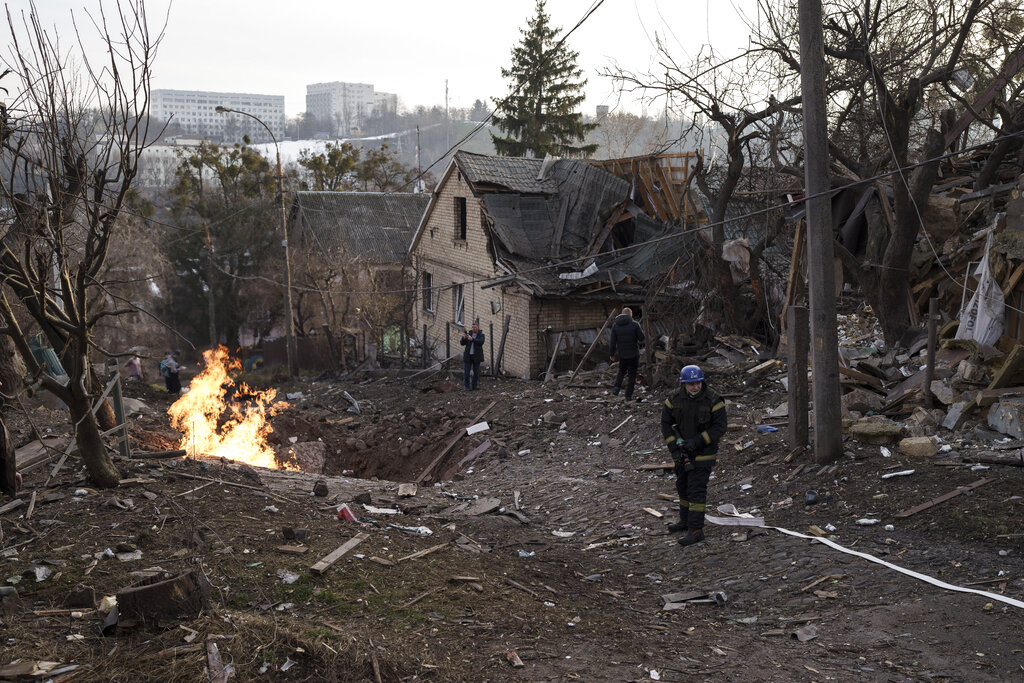
Russia claimed Friday to have completed its capture of the town Soledar in eastern Ukraine Friday after months of fighting in a brutal offensive that would hand the Kremlin its first significant battlefield gain since July after a wave of military setbacks.
Ukraine insists that the fighting was far from over. Deputy Defense Minister Hanna Malyar described the phase of the war as being “difficult,” but the conflict in Soledar is “hot,” she wrote Friday on Telegram. “The enemy threw almost all the main forces in the direction of Donetsk and has maintained a high intensity of the offensive,” she said. “Our fighters are bravely trying to hold the defense.”
The battle for Soledar, a small salt-mining town, has emerged as a critical step in Moscow’s goal of encircling the key city of Bakhmut, a transportation hub under assault since August, and ultimately capturing the entire Donbas region. The fighting has intensified in recent weeks as the one-year anniversary of Russia’s unprovoked Feb. 24 invasion approaches, with Russia pummeling Soledad at the expense of steep losses to its own forces.
Amid competing claims over control of the city, images geolocated by the Institute for the Study of War, a Washington-based military research group, show Russian forces likely hold most, if not all, of Soledar, while pushing Ukrainian forces to the west.
Read More: Ukraine Dismisses Russia’s Declaration of a Holiday Ceasefire
Officials from both sides have referred to the battle as a “meat grinder,” with streets strewn with corpses of soldiers. Ukrainian President Volodymyr Zelenskyy said earlier this week there was “almost no life” in Soledar and “no whole walls left” on any building in the mining town. “This is what madness looks like,” he said in a nightly video address on Monday.
The Russian Defense Ministry said Friday on its Telegram channel that the private military company Wagner Group was responsible for leading the “direct assault.” It was a rare nod to Wagner, which is financed by Yevgeny Prigozhin, the Russian oligarch sometimes called “Putin’s Chef” because he rose to power after running a catering company favored by the Kremlin. “Putin’s shadow army” is estimated to have thousands of members, including former convicts, and has acted as a mercenary force fighting on behalf of Russia in a way that allows Moscow a measure of deniability. The Wagner Group first appeared in 2014 during Russia’s annexation of Crimea.
Capturing Soledar would be critical for Russia’s war aims but also Prigozhin, who has repeatedly criticized Russia’s Defense Ministry and its management of the Ukraine war. His group has deployed to other hot spots around the world, including Libya, Sudan, the Central African Republic, Madagascar, Mozambique, Mali, and Syria (where Wagner mercenaries fought a bloody battle with U.S. special forces in 2018). But achieving victory in Soledar will be a personal victory for Prigozhin, who feels his forces deserve more credit. He may also aspire to take control of the town’s salt and gypsum mines for personal enrichment.
Read More: Biden Deepens Involvement in War by Inviting Ukrainian Troops to U.S. for Weapons Training
White House National Security Council spokesman John Kirby said “there’s a bit of an economic incentive” for Russia to take Soledar, but any victory would be more symbolic than substantive. “Even if both Bakhmut and Soledar fall to the Russians, it’s not going to have a strategic impact on the war itself,” Kirby told reporters Thursday at the White House. “And it certainly isn’t going to stop the Ukrainians or slow them down.”
Kirby described the greater Donbas region as an open region of farmland akin to Kansas. It’s crucial, he said, that the U.S. continues to provide “the kinds of capabilities to Ukraine to be able to succeed in that environment.” The Bradley Fighting Vehicles, which were part of the $2.85 billion military aid package announced last week, will be vital to safely transport troops around the battlefield during this grinding phase.
On Friday, U.S. Secretary of State Antony Blinken spoke with Ukrainian Foreign Minister Dmytro Kuleba and committed to continuing economic and security support for Kyiv. “The Secretary emphasized the United States’ enduring and unflinching support for Ukraine, as underscored by recent provisions of advanced air defense equipment and armored vehicles from U.S. stocks,” according to the readout.
Blinken told Kuleba that U.S. assistance would continue to flow “in the run-up to, and beyond” the first anniversary of Russia’s invasion. As the battle for Soledar shows, the end of the war remains nowhere in sight.
More Must-Reads from TIME
- Introducing the 2024 TIME100 Next
- The Reinvention of J.D. Vance
- How to Survive Election Season Without Losing Your Mind
- Welcome to the Golden Age of Scams
- Did the Pandemic Break Our Brains?
- The Many Lives of Jack Antonoff
- 33 True Crime Documentaries That Shaped the Genre
- Why Gut Health Issues Are More Common in Women
Write to W.J. Hennigan at william.hennigan@time.com